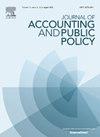负利率与银行公司税行为
IF 2.2
3区 管理学
Q1 BUSINESS, FINANCE
引用次数: 0
摘要
本文以经合组织国内银行为样本,采用差异中差异研究设计,考察了负利率制度对企业税收行为的影响。我们的研究表明,近红外光谱的引入与有效税率下降2.3至2.6个百分点有关。近红外效应在离违约距离较低的银行,以及税收执法力度较低或对政府信任度较低的国家更为明显。总体而言,我们的研究结果表明,与NIRs相关的成本增加由商业银行承担,这导致它们各自的税收筹划增加。本文章由计算机程序翻译,如有差异,请以英文原文为准。
Negative interest rates and corporate tax behavior in banks
Using a sample of OECD domestic banks and a difference-in-difference research design, we examine the impact of Negative Interest Rate (NIR) regimes on corporate tax behavior. We document that the introduction of NIRs is associated with a 2.3 to 2.6 percentage point decrease in effective tax rates. The effect of NIRs is more pronounced in banks with lower distance to default, and in countries with lower tax enforcement or lower trust in the government. Collectively, our results suggest that the increased costs associated with NIRs are borne by commercial banks which lead to an increase in their respective tax planning.
求助全文
通过发布文献求助,成功后即可免费获取论文全文。
去求助
来源期刊

Journal of Accounting and Public Policy
Multiple-
CiteScore
4.80
自引率
2.80%
发文量
75
期刊介绍:
The Journal of Accounting and Public Policy publishes research papers focusing on the intersection between accounting and public policy. Preference is given to papers illuminating through theoretical or empirical analysis, the effects of accounting on public policy and vice-versa. Subjects treated in this journal include the interface of accounting with economics, political science, sociology, or law. The Journal includes a section entitled Accounting Letters. This section publishes short research articles that should not exceed approximately 3,000 words. The objective of this section is to facilitate the rapid dissemination of important accounting research. Accordingly, articles submitted to this section will be reviewed within fours weeks of receipt, revisions will be limited to one, and publication will occur within four months of acceptance.
 求助内容:
求助内容: 应助结果提醒方式:
应助结果提醒方式:


